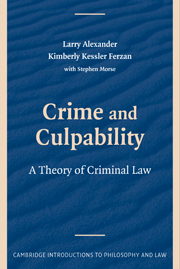Epilogue
Published online by Cambridge University Press: 05 June 2012
Summary
Our entire book has been devoted to the implications of having criminal liability turn on the pivots of the risks the actor perceives and the reasons for which he chooses to impose those risks. In many respects, our analysis and prescriptions are clear departures from criminal law orthodoxy, both doctrinal and theoretical. Although we believe that our approach is perhaps not as radical as it might appear to be – after all, many critics are uncomfortable with making inadvertent negligence a basis for criminal liability; many (theorists, at least) are persuaded that results should not matter to criminal liability; recklessness, with its axes of risks and reasons, is already a fundamental component of criminal law; and inchoate criminal liability is a controversial and confusing domain – we concede that all our proposals taken together will be sufficiently dramatic that the burden of persuasion we carry is properly a heavy one. Nonetheless, we believe we have met it. At the very least, we believe we have presented and justified an internally coherent version of a criminal law based on meting out retributive justice.
- Type
- Chapter
- Information
- Crime and CulpabilityA Theory of Criminal Law, pp. 325 - 326Publisher: Cambridge University PressPrint publication year: 2009



